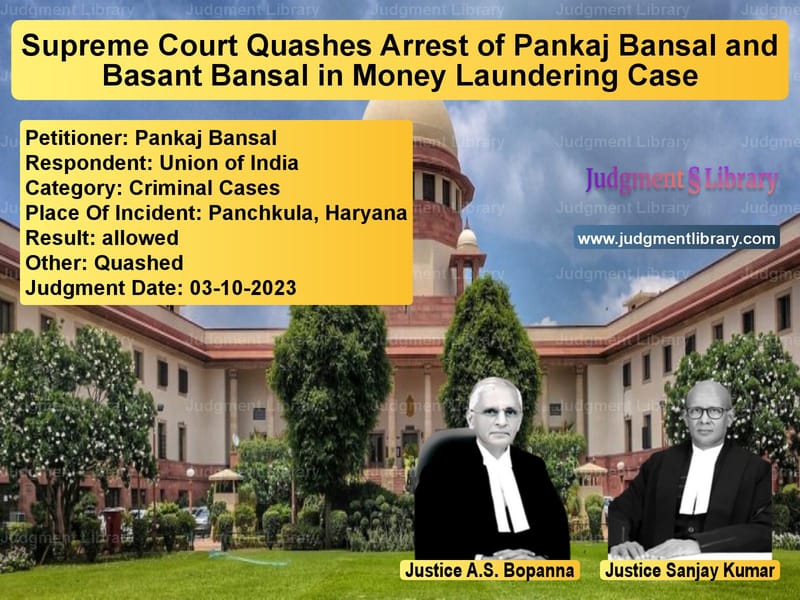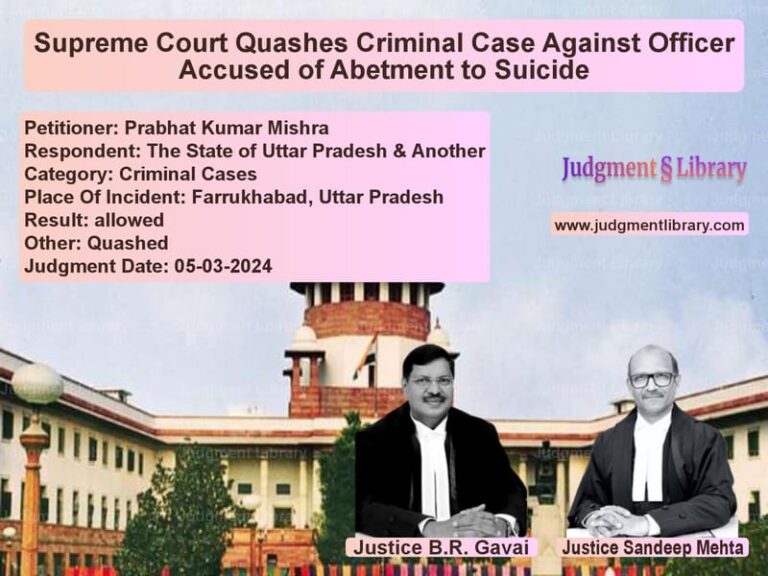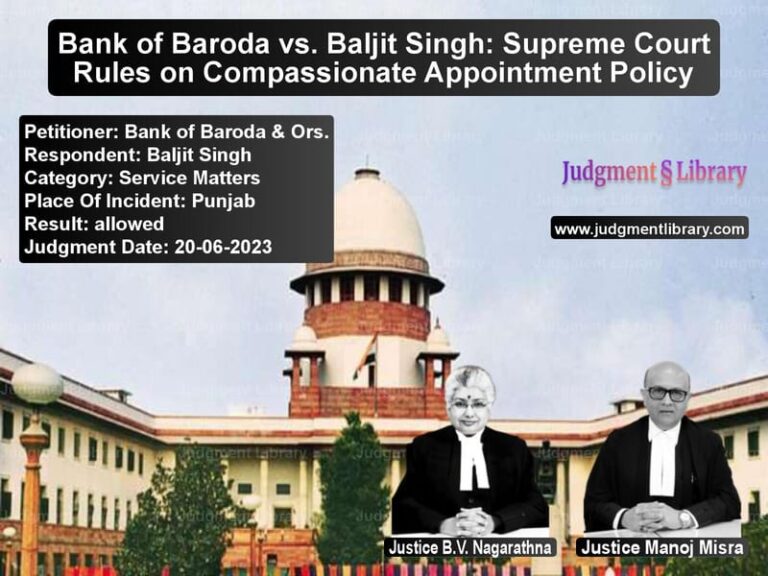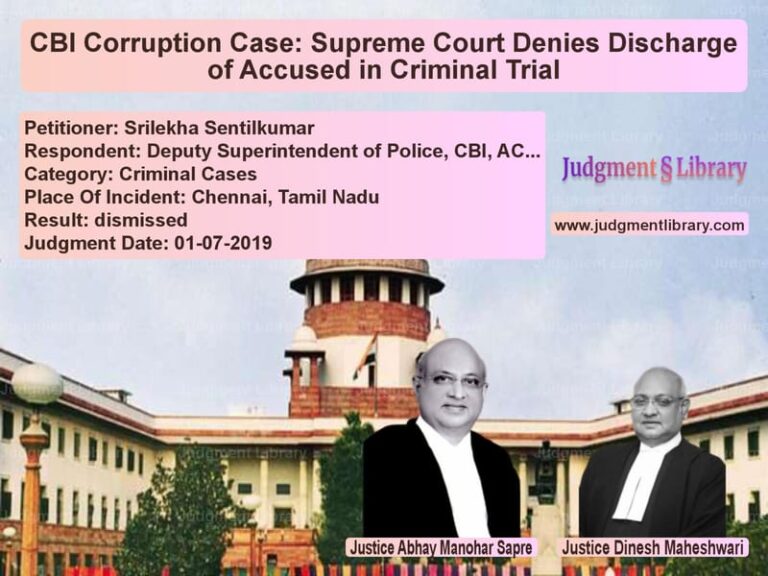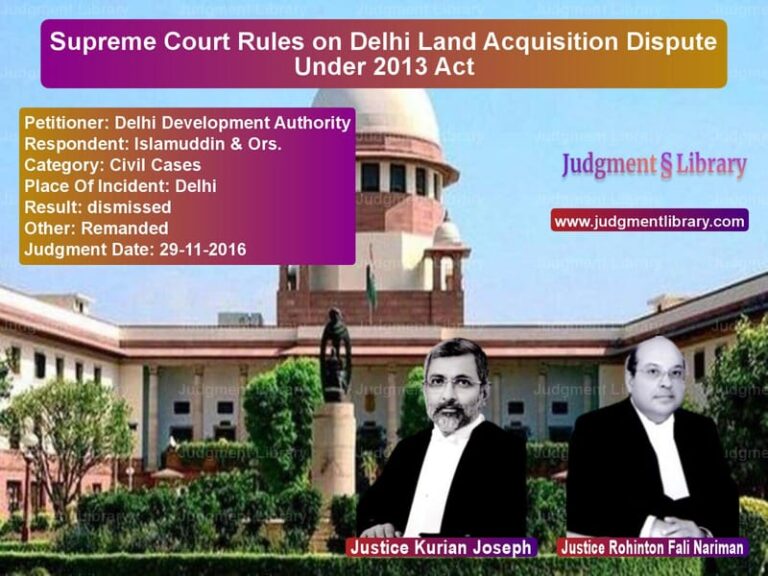Supreme Court Quashes Arrest of Pankaj Bansal and Basant Bansal in Money Laundering Case
The recent Supreme Court judgment in Pankaj Bansal vs. Union of India has set an important precedent regarding the arrest procedures under the Prevention of Money Laundering Act, 2002 (PMLA). The case revolved around the legality of the arrest of Pankaj Bansal and Basant Bansal by the Enforcement Directorate (ED) and whether the due process under Section 19 of PMLA was followed. The Court ruled in favor of the appellants, quashing their arrest and setting them free unless required in any other case.
Background of the Case
The case stemmed from an FIR registered on April 17, 2023, by the Anti-Corruption Bureau (ACB), Panchkula, Haryana. The FIR accused several individuals, including:
- Sudhir Parmar, the then Special Judge, CBI and ED, Panchkula
- Ajay Parmar, his nephew and Deputy Manager (Legal) in M3M Group
- Roop Bansal, a promoter of M3M Group
- Other unidentified individuals
The allegations centered on corruption and bribery in connection with the real estate firm IREO Group, leading the ED to initiate an Enforcement Case Information Report (ECIR) on June 13, 2023. Subsequently, the ED arrested Pankaj Bansal and Basant Bansal on June 14, 2023.
Arguments by the Petitioner – Pankaj Bansal and Basant Bansal
The petitioners, Pankaj Bansal and Basant Bansal, contended the following:
- Violation of PMLA Safeguards: Their arrest did not comply with Section 19 of PMLA, which mandates that arrests must be based on written reasons that must be recorded and communicated to the accused.
- Retaliatory Action: The petitioners claimed that their arrest was a retaliatory action by the ED, especially after they secured interim anticipatory bail from the Delhi High Court in another ECIR.
- Improper Remand Orders: They alleged that the remand orders were passed in a mechanical manner, without judicial application of mind.
- Failure to Communicate Grounds of Arrest: The grounds for their arrest were neither furnished in writing nor explained properly, violating their fundamental rights under Article 22(1) of the Constitution.
Arguments by the Respondent – Union of India & Enforcement Directorate
The Enforcement Directorate, defending its actions, presented the following arguments:
- Money Laundering Allegations: The ED asserted that both Pankaj and Basant Bansal were involved in money laundering activities linked to M3M Group and IREO Group.
- Valid Arrest under Section 19: The ED claimed that it had sufficient material to believe that the petitioners were guilty of money laundering, justifying their arrest.
- Non-Cooperation: The agency alleged that the petitioners failed to cooperate with the investigation and provided evasive answers when questioned.
- Threat of Witness Tampering: The ED argued that the accused had the potential to influence witnesses and obstruct the investigation.
Key Observations by the Supreme Court
The Supreme Court made several critical observations while quashing the arrests:
1. Failure to Follow Due Process under Section 19 of PMLA
The Court held that the ED failed to properly record its reasons for believing the petitioners were guilty of money laundering. It reiterated that under Section 19(1) of PMLA, the investigating officer must record such reasons in writing and communicate them to the arrested persons.
2. Violation of Constitutional Safeguards
The Court emphasized that Article 22(1) of the Constitution guarantees that no individual shall be detained without being informed of the reasons for their arrest. The ED’s failure to furnish written grounds of arrest amounted to a serious violation of fundamental rights.
3. Abuse of Power by the ED
The judgment strongly criticized the ED’s actions, stating that the agency acted in a vindictive manner by arresting the petitioners immediately after they secured interim bail in another case. The Court remarked that the ED’s approach “reeks of arbitrary exercise of power.”
4. Requirement to Furnish Written Grounds of Arrest
The Court noted that while PMLA mandates informing the accused of the grounds of arrest, different ED offices across the country follow varying practices—some provide written grounds, while others merely read them out. The Court held that, going forward, the ED must furnish a written copy of the grounds of arrest to all accused persons.
5. Improper Remand Orders
The Court found that the Punjab & Haryana High Court, as well as the Additional Sessions Judge, Panchkula, failed to properly apply their minds while passing remand orders. The remand was granted based on a routine approach without verifying if Section 19(1) of PMLA was complied with.
Supreme Court’s Final Ruling
Based on the above observations, the Supreme Court:
- Quashed the arrest orders of Pankaj Bansal and Basant Bansal.
- Struck down the remand orders passed by the Punjab & Haryana High Court and the Additional Sessions Judge, Panchkula.
- Directed that the petitioners be released immediately unless detained in any other case.
- Mandated that going forward, ED must provide a written copy of the grounds of arrest to all arrested individuals.
Implications of the Judgment
The Supreme Court’s ruling has far-reaching implications:
- Strengthens Protections under PMLA: This judgment reinforces the rights of individuals arrested under PMLA, ensuring that procedural safeguards are followed.
- Prevents Arbitrary Arrests: The ruling curtails the ED’s ability to make arrests without proper justification and ensures accountability.
- Standardizes Arrest Procedures: By mandating the provision of written grounds of arrest, the judgment brings uniformity in how the ED executes arrests.
- Guidance for Future Cases: The case serves as a precedent for individuals challenging improper arrests under PMLA.
Conclusion
The Supreme Court’s decision in this case is a landmark ruling that upholds the constitutional rights of accused persons under PMLA. By striking down arbitrary arrests and remand orders, the Court has sent a clear message that investigative agencies must adhere to procedural safeguards. The ruling ensures that no individual is deprived of liberty without due process and sets a significant precedent for future cases involving enforcement agencies.
Petitioner Name: Pankaj Bansal.Respondent Name: Union of India.Judgment By: Justice A.S. Bopanna, Justice Sanjay Kumar.Place Of Incident: Panchkula, Haryana.Judgment Date: 03-10-2023.
Don’t miss out on the full details! Download the complete judgment in PDF format below and gain valuable insights instantly!
Download Judgment: pankaj-bansal-vs-union-of-india-supreme-court-of-india-judgment-dated-03-10-2023.pdf
Directly Download Judgment: Directly download this Judgment
See all petitions in Money Laundering Cases
See all petitions in Bail and Anticipatory Bail
See all petitions in Fraud and Forgery
See all petitions in Judgment by A. S. Bopanna
See all petitions in Judgment by Sanjay Kumar
See all petitions in allowed
See all petitions in Quashed
See all petitions in supreme court of India judgments October 2023
See all petitions in 2023 judgments
See all posts in Criminal Cases Category
See all allowed petitions in Criminal Cases Category
See all Dismissed petitions in Criminal Cases Category
See all partially allowed petitions in Criminal Cases Category

